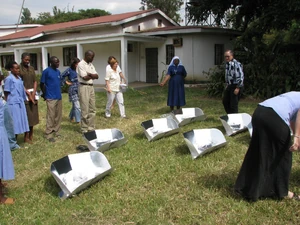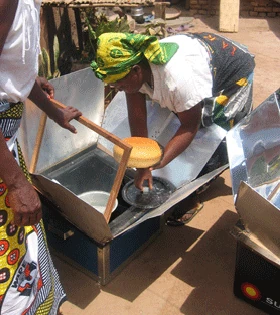Paul Hedrick (talk | contribs) |
Tom Sponheim (talk | contribs) m (→See Also) |
||
| Line 105: | Line 105: | ||
*See also general guidance on [[raising funds through grants and donations]] |
*See also general guidance on [[raising funds through grants and donations]] |
||
| + | |||
| − | ==See Also== |
||
| − | *[[:Category:{{PAGENAME}}|Click here for the complete list of Solar Cooking Wiki articles related to {{PAGENAME}}]] |
||
[[Category:East Africa]] |
[[Category:East Africa]] |
||
[[Category:Africa]] |
[[Category:Africa]] |
||
Revision as of 18:08, 1 June 2011
Events
News and Recent Developments
- November 2010: Stellaris Ministries led solar cooking trainings in the community of Singida this past summer. They are making a documentary film about the solar cooking needs of the people of Tanzania. A preview clip of the film is available for comment.
- August 2010: A two-week exhibition to promote science education is currently taking place at the Alliance Francaise in Dar es Salaam. It’s an interactive and educative exhibition under the theme ‘The earth’s future is in our hands’. The event, organised by the French embassy in collaboration with the Alliance Francaise and the International Institute of Tropical Agriculture, will be held for two weeks. It started August 24, and will end September 6. This year’s event is meant to provide students and the public with alternatives to energy, says Abel Shuma, an official of the Alliance Francaise. The students are able perform a number of experiments, including solar cooking. Exhibition promotes science education -The Citizen
- July 2010: Primary school pupils in four districts in Tanzania will benefit from the use of solar cookers distributed by an institution called Solar Oven Society (SOS) Africa. A total of 240 solar cookers will be distributed to primary schools in the four districts. The use of the cookers will reduce unscrupulous tree felling. Schools to get solar cookers
- February 2010: Sol Suffit is working to bring its super-clean and super-simple solar cooker to developing nations, to replace the environmentally-devastating traditional cooking methods that rely on firewood and charcoal. The project started in the Djoudj National Bird Park, a World Heritage site in Senegal, and now has also set up shop in Pikine, a suburb of Dakar, across the continent in Tanzania, and is currently working to establish a presence in Cameroon with a partner organization. Project leader Axel Vanderhaeghen said, based on "the response from everyone who gets to know the project, we're very certain it won't stop in Cameroon. Also, we found a way to introduce bigger solar cookers now, thanks to microcredits." They are looking for partner organizations to help with their efforts. Read more at: Solar Cookers Taking Hold in Africa: Want to Help?
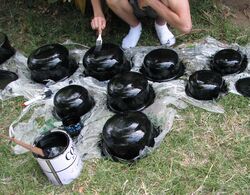
TanzSolar participants paint aluminum pots with blackboard paint for use in solar cookers.
- November 2008: Solar Cookers International (SCI) recently collaborated with the upstart solar organization TanzSolar to provide a comprehensive solar presentation to 20 local professionals in Musoma. Founded by Marianne Walpert of California, USA, TanzSolar provides affordable photovoltaic solar panels to rural internet companies, individuals and small businesses in northern Tanzania, and is interested in working with SCI to spread solar cooking and solar water pasteurization in northern Tanzania. SCI’s eastern Africa staff members are currently planning a five-day solar cooking and water treatment workshop at the TanzSolar facilities in Musoma, as well as future collaborations in the region. In addition, TanzSolar has become a distributor of solar lanterns that SCI hopes to utilize in some of its project areas in the future.
- September 2008: Karyn Ellis of Solar Cookers International (SCI) writes: "I traveled to Musoma, Tanzania to pursue collaborations between SCI and TanzSolar ~ a newly established nonprofit that will provide affordable solar panels to local internet organizations, health clinics, schools, small businesses and individuals throughout Tanzania. While TanzSolar specializes in photovoltaic (PV) systems, they are interested in expanding their solar reach and open to working with SCI to bring simple solar cooking and water pasteurization techniques to the area as well. Marianne Walpert and her sons showed me great hospitality while I was in Musoma, treating me like family and taking time from their busy schedules to help with a solar demo and introduce me to some active and influential business people in the community; like Sergio Velasquez of Mano a Mano, and Robi Machaba of JuaSun, a local internet company that works closely with Marianne and TanzSolar. With their help we rounded up a good group of locally active individuals interested in improving their environment by providing alternative methods of cooking, treating water and generating income in their community. Together we organized a very successful day of informational presentations on solar cooking and water pasteurization ideologies, processes and techniques, generating a great deal of participation and interest. With the help of those listed above and SCI's East Africa Office, SCI and TanzSolar will plan to host a 5-day integrated solar workshop on the TanzSolar grounds later in the year." See the Photo Blog here: http://www.solarcookers.org/news/2008/06/tanzania-and-tanzsolar.html

Solar box cookers are assembled by local artisans in Masasi and Ndanda
- March 2008: The Okemos, Michigan (USA) nonprofit organization Solar Circle continues its efforts to make solar cooking an option for women in Tanzania. Solar Circle works with local artisans to manufacture solar box cookers from Cyprus wood, aluminum printing plates, glass, used rubber, and other materials available in Tanzania. However, these cookers cost $70 or more to build, and are heavily subsidized to be affordable. Solar Circle has partnered with engineering students at Michigan State University (MSU) to design lighter, less expensive models that can still be made with local materials. Last year, professor Craig Somerton took nine of the students to Masasi, Tanzania to work with Brother Yohannes Mango and his team of artisans at the Benedictine Abbey in Ndanda. According to the Solar Circle Web site, the “students came armed with sound scientific theories on the behavior of light and heat, and met up with artisans experienced in constructing solar ovens. They worked together to test and improve the ovens. The artisans learned some theory, the students learned some practicalities of building without power tools and computer enhancements.” The students also spent time teaching the local population how to use the solar cookers. The on-line journal MSU Today International reported that, while the students were in Masasi, professor Brian Thompson spent time in Dar es Salaam and Morogoro working “to make the use of solar ovens a nationwide reality by networking with numerous agencies before formulating a broad initiative” involving businesses, governmental entities, and schools. The Shell foundation, for example, has since funded a solar cooking workshop in Morogoro at Sokoine University. As noted on the Solar Circle Web site, many agency representatives, entrepreneurs and policy makers attended and “gathered to learn about solar cooking and brainstorm best ways to promulgate solar cooking in Tanzania.” A number of solar cookers were on display, including models from South Africa, Netherlands, and the United States.
- 2008: Moto uko wapi? “Where is the fire?" This is the question asked by people experiencing solar cooking and solar cooked foods for the very first time. Dieter Aneca, from Belgium, and Calvin Chikawe assisted by two local women are causing a stir solar cooking in Morogoro. Deiter writes; ”In 2007 I finished my studies in Belgium in the environmental sector. Before coming to Tazmania, I came in contact with Sol Suffit, who have solar cooking projects in Senegal. They gave me two cookers to use in Tazmania, to test solar cooking myself. Following up with Sol Suffit, we decided to start a project here and named it Sola Sufuria. In this project we plan to make solar cookers available in and outside of the Morogoro region. Solar Cookers International (EA) has assisted us in sourcing for reflective aluminum foil papers and plastic cooking bags as well as leading us to a supplier for the correct glue. We are grateful to SCI (EA) and will continue to work with them as we plan for a permanent production center to meet the growing demand.
- Spring 2007: The Baptist mission is busy spreading solar cooking knowledge and skills in Dodoma. Having bought four CooKits initially, they made more from carton and glue and recently requested 24 more. (Source: the Appropriate Technology Development Resource Center in Dodoma, Tanzania)
- April 2007: The Web site of Solar Circle tells an inspiring story of how a few people can make a big difference by working together. Solar Circle is a US-based nonprofit organization made up of a network of friends, mostly women. A few years ago, Solar Circle took two dozen American-made Global Sun Ovens® to Masasi, Tanzania, where they were enthusiastically received. However, people quickly saw the impossibility of importing enough ovens to overcome high purchase and transport costs. Consequently, Solar Circle has started a small industry in Tanzania to build solar box cookers. Several Tanzanian craftspeople have joined in the effort. They make the outer box from cypress wood, which is treated with cashew nut oil to repel insects. Reflective surfaces are made by collecting and cleaning discarded lithographic plates, and crafting them into the proper shapes. Gaskets are made from used tires or shoe leather. Students from the Mechanical Engineering Design Program at Michigan State University (USA) are collaborating to develop a model that is lighter, cheaper and more efficient, using only domestic Tanzanian materials and manufacturing processes. Mlelwa, one Tanzanian who built a solar oven, coined a new proverb: “People say 'Jua kali,' but we know 'Jua ni mali.'” ("People say the sun is hot today, but we know the hot sun is wealth"). Contact: Solar Circle
- June 2006: Solar Household Energy, Inc.'s Director of Programs for Latin America and East Africa, Camille McCarthy, traveled to Kenya and Tanzania to meet with governmental agencies, NGOs, and private sector representatives to explore the feasibility of cooperative solar cooking ventures. Many groups expressed interest in SHE pilot solar cooking projects. SHE expects to conduct initial solar cooking training, marketing and sales projects in Kenya and Tanzania in early 2007.
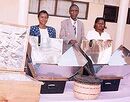
- March 2006: Sperancea Gabone recently held a solar cooker exhibition at Mawenzi primary school in Moshi, Tanzania. Over 20 people gathered to learn about solar cooking and to taste solar-cooked food, including ugali, meat, beans and rice. Rolf Behringer, of the International Solar Energy Society (ISES), led a solar box cooker construction workshop at nearby Karanga Technical School, and joined Ms. Gabone at the exhibition. In addition to solar box cookers, retained-heat cookers were also used. (A retained-heat cooker, also known as a fireless cooker or “hay box,” is an insulated enclosure in which is set a pot of food that has been brought to a boil, allowing it to continue to cook after being removed from its heat source.) Contact: Sperancea Gabone
- July 2005: AltEner Energy Technologies presented a 3-square-meter Scheffler reflector for observation at the 19th Mara Development Forum in Mugumu, Serengeti District, Tanzania. Scheffler reflectors are large parabolic dishes that are often used to heat a cooking medium (such as water to make steam) that is circulated to one or more indoor cooking stations. This is a smaller version. Mr. Charles Onyango-Oloo of AltEner says the new design is user friendly since "the port is mounted on one side and not in the middle of the reflector dish." AltEner is currently developing a 1.5-square-meter, manually tracked Scheffler cooker.
The History of Solar Cooking in Tanzania
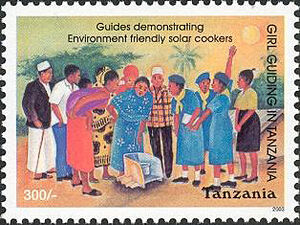
In 2004 Tanzania Posts Corporation released a series of postage stamps commemorating the 75th anniversary of Girl Guiding in Tanzania. Included in the set was a stamp depicting Girl Guides “demonstrating environment friendly solar cookers.”
Wide ranges of projects are found in Tanzania, many located in schools, missions, or local training centers. Solarafrica, a Zanzibar organization, has promoted both basketry and solar ovens on the island of Zanzibar for many years, sponsored by the Esperanto Club of Lund, Sweden. Early in the development of connections between the two areas, the shortages of fuel for cooking were noted. Swedish participants have developed a number of simple technologies that can be locally made, such as parabolics of cardboard lined with foil, and another formed from a large flat basket. (Solar Cooker Review, Sept '02).
Yet another project on Zanibar, sponsored by a German group, Mama Earth, uses both parabolic cookers and boxes, preferring to cook some food in the slower box and the parabolic for "speed cooking" rice, and also for dying plaited palm leaves for craft use.
In addition, the group is experimenting with the use of flattened beer cans as reflectors in a frame of wood or metal for homemade cookers.
The GEF Small Grants Programme funded a project by the Kagera Community Development Trust, Bukoba - KADET in 1999 that produced 40 solar box cookers. Progress reports showed that the technology was replicated in various parts of Kagera region.
Another German group, Solar Cooking Zanzibar, is also located on the large island offshore from the mainland of Tanzania. The focus of this group is craft and artisan development; they have used solar cookers to dye fabrics and basketry material for craftwork. Some of the profits have enabled members to purchase solar cookers for their own household use (Solar Cooker Review, Aug, '02). The German electric utility, Bayernwerke, has made possible the provision of parabolic cookers for a local fishing village, as well, and a number of sponsoring organizations have made possible the building of a workshop and solar powered kitchen. (Solar Cooker Review, Aug '00).
On mainland Tanzania, a religiously affiliated group, EAG (T)Church - MJIMWEMA in Kigoma produces locally made parabolic or "bowl" type cookers. The Evangelical Lutheran Church of Tanzania in Morogoro Province has conducted research on fuelwood use, and then began using parabolic cookers, sent from Germany, for cooking, pasteurizing water, and firing clay bricks. The Kilimanjaro Biolgas and Solar Centre sponsors many types of renewable energy and has been active in solar cooking promotion for many years. (SCI Rev Dec 00). Many of the devices promoted by Anna Pearce (see "multiple-nation" promoters section above) are in use in Tanzania, particularly the "Anahat" cooker/hatbox combination. Other organizations working in Tanzania are the Ilemi Secondary School of Mbeya, Net-Score of Malinyi, and Solar Innovations of Tanzania.
In the summers of 2001, 2002 and 2003, Project AHEAD, an American NGO, demonstrated the use of solar cookers for water pasteurization in two areas of Tanzania, first in Shinyanga District, in the northwest of the country, and the second in Kisarawe, near Dar es Salaam. National and district health officers have attended workshops on the technologies of water testing for contamination, followed by demonstration of the use of solar cookers for water pasteurization. In the summer of 2003, household surveys were conducted in both districts to serve as baseline data and an evaluation tool for a large project to be mounted in the period, 2004-2006, funds permitting. This will be the first major demonstration project focused on the use of solar cookers for this purpose. Because of the innovative nature of this project, a case study on this topic is included with this report.
[Information for this section was taken originally from State of the Art of Solar Cooking by Dr. Barbara Knudson]
Climate, Culture, and Special Considerations
Solar Cookers International has rated Tanzania as the #9 country in the world in terms of solar cooking potential (See: The 25 countries with the most solar cooking potential). The estimated number of people in Tanzania in sunny areas of the country but with fuel scarcity in 2020 is 7,500,000.
Tanzania is experiencing a demographic and an environmental crisis. Tanzania has a population of around 37 million. It has a fertility rate of almost five children per woman. This rapidly growing populace places extreme pressure on the environment. For example, forests are being diminished rapidly in significant part by demand for fuel wood. A case in point: between 1960 and 1980, the Amani forest in Tanzania was reduced by 50%. For every 28 trees cut in Africa today, only one is planted.
As forests around communities are degraded, women and children must forage for fuel wood further and further from home. In some places, women must camp overnight in the bush. When the distances become too great, some families must pay 25% to 50% of their income to buy cooking fuel.
See also
- Discussion of eastern Africa's suitability for solar cooking
- Solar cooker dissemination and cultural variables
Resources
Possible funders of solar cooking projects in Tanzania
Blogs
Reports
- July 2008: East Africa Report - Karyn Ellis
Articles in the media
- August 2010: Statements from Global Resource Alliance Tanzania training officer, Christopher Gamba, with video Solar cooking reaches northern Tanzania - Africa News'
- July 2010: Schools to get solar cookers- The Citizen Reporter, Dodoma
- January 2008: Tel Aviv students come face-to-face with the Third World - The Jerusalem Post
- October 2007: Purdue students build solar oven for use in Tanzania - Purdue University News
- May 2007: Solar Circle provides impetus for change - Lansing State Journal
- January 2007: Couple's Vacation Turns into Crusade - The Livingston Daily
- December 2006: Student sows seeds of community-helping technology in Africa
Web pages
Audio and video
Solar cooking in Zanzibar
Contacts
The entities listed below are either based in Tanzania, or have established solar cooking projects there:
SCI Associates
- Main article: Solar Cookers International Association
NGOs
Manufacturers and vendors
Individuals
Government agencies
Educational institutions
See also
References
Possible funders of solar cooking projects in Tanzania
- GEF Small Grants Programme
- See also general guidance on raising funds through grants and donations


